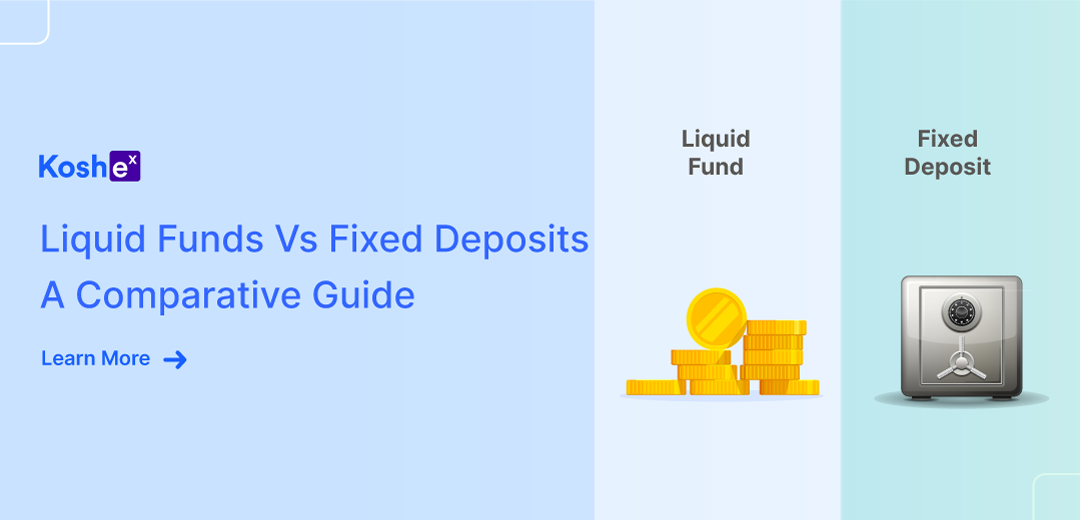Explore the choice between Liquid Funds and Fixed Deposits in our article”Liquid Funds vs Fixed Deposits: What Should You Choose?” Gain insights into the pros and cons of each investment option as we dissect the choices within the realm of “Liquid Funds vs Fixed Deposits.”
Liquid Funds Vs Fixed Deposits – A Comparative Guide
Risk appetite plays an important role in most of our investment decisions. In India, fixed deposits (FDs) and liquid funds are two of the most popular investment options among investors with moderate to low-risk appetite. Both offer distinct benefits and cater to different financial goals. While FD is a regular household investment avenue, a report by BankBazaar, as mentioned by Times of India on 18th November 2022 said that it was the first time ever that mutual funds overtook FDs. The survey found that 57% of respondents invested in mutual funds, and 54% invested in FDs.
However, it is important to know which option is ideal for which type of investor. Let’s check out this detailed guide on liquid funds vs fixed deposits to help you make informed investment decisions based on your specific requirements and risk appetites with Koshex.
What are Fixed Deposits?
Fixed Deposits are low-risk investment instruments offered by banks and Non-Banking Financial Companies (NBFCs). Here, you can deposit a lump sum amount for a predetermined period at a fixed interest rate. The principal and interest earned are returned upon maturity. FDs are popular among risk-averse investors because of their safety and guaranteed returns.
What are Liquid Funds?
Liquid Funds, on the other hand, are a type of debt mutual fund that primarily invests in short-term money market instruments such as treasury bills, commercial papers, and certificates of deposit. These funds are designed to provide you with high liquidity and relatively stable returns. Liquid Funds are often considered a better alternative than keeping money in a savings bank account as they offer potentially better returns and more liquidity.
Comparison Between Liquid Funds vs Fixed Deposits
Here’s a comparative guide on liquid funds vs fixed deposits based on various factors to enable you to make informed investment decisions:
| Factors | Fixed Deposits | Liquid Funds |
| Returns | Fixed deposits carry a low to moderate fixed interest rate. | Liquid funds provide returns that are potentially higher than fixed deposits. |
| Suitable For | Fixed deposits carry almost zero risk. Therefore, they are suitable for risk-averse investors for whom the safety of capital is more important than returns. | While liquid funds also carry low risk, they are riskier as compared to fixed deposits. Investors who desire liquidity and have short-term financial goals, want to build an emergency fund, or have surplus funds prefer liquid funds. |
| Risk | Fixed deposits carry very low risk. Further, FDs are insured up to Rs. 5 lakhs by the DICGC. | Liquid funds also carry low risk due to the short duration of the underlying instruments. But the risk factor is a bit higher than the fixed deposits. |
| Premature Withdrawals | Usually allowed with a penalty and reduced interest rate | Generally, no penalty for early redemptions, providing high liquidity |
| Cost | Investing in fixed deposits attracts no cost or minimal charges on investing. | Investing in liquid funds attracts certain costs and charges including expense ratio, management fees, and other charges. |
| Taxation | Interest earned on fixed deposit investments is taxable as per the investor’s income tax slab. | Returns on liquid funds are classified as capital gains under income tax law. The gains will be taxed when you sell your investments. The returns will be taxed when you liquidate your investments at the tax rate applicable to you. |
| Minimum Investment | The minimum amount to invest in fixed deposits varies across different banks and financial institutions. | Liquid mutual funds come with low minimum investment requirements and thus, allow easy entry for investors. |
| Lock-in Period | Fixed deposits come with a fixed lock-in period. Liquidating fixed deposits before maturity can lead to penalties or loss of interest. However, you get to select between different investment tenures. | Liquid funds are highly liquid in nature. You can withdraw your investments at any time based on your needs. However, it may attract an exit load as per the terms of the scheme. |
Where Should You Invest?
Above was a detailed comparative analysis of the different features of liquid funds vs fixed deposits. The decision between investing in fixed deposits or liquid funds depends on your financial goals, risk tolerance, and investment horizon. Here are certain points that will assist you in selecting the right investment avenue:
You Should Choose Fixed Deposits:
- If you prefer capital safety over higher returns.
- If you have a fixed investment horizon and do not require immediate access to funds.
- If you want to avoid exposure to market fluctuations and maintain a predictable income.
You Should Choose Liquid Funds:
- If you have short-term financial goals and need high liquidity.
- If you are willing to take slightly more risk for the potential of higher returns than conventional investment avenues.
- If you want tax efficiency, you can invest in liquid funds. While the interest on fixed deposits is taxed each year, gains on liquid funds will be taxed when you redeem your investments at the tax rate applicable to you (after removal of indexation benefit w.e.f. 1st April 2023).
In a Nutshell
Both fixed deposits and liquid funds have their merits and cater to different investment needs. Fixed deposits offer safety and predictability to investors, making them suitable for risk-averse investors and longer investment horizons. On the other hand, liquid funds provide higher liquidity, and competitive returns, making them ideal for short-term goals and emergency fund needs. Ultimately, you should carefully assess your financial objectives and risk appetite before deciding which investment avenue aligns best with your financial plan.
The next step is to find out how to invest in these avenues. Koshex is a one-stop investment platform that allows you to invest in both liquid funds as well as fixed deposits. It allows you to select among 5000+ different mutual funds to invest in a scheme that aligns with your investment goals and preferences. You can also invest in other avenues like smart deposits or digital gold if you wish to further diversify your portfolio. Sign up with Koshex now!
Frequently Asked Questions
Q: Are liquid funds risk-free?
A: While liquid funds are relatively low-risk investments due to their short-term nature and portfolio composition, they are not entirely risk-free. The returns of these funds can fluctuate slightly depending on the performance of the underlying money market instruments.
Q: Can I withdraw money from a fixed deposit before maturity?
A: Yes. You can withdraw money from a fixed deposit before maturity. However, banks usually impose a penalty for premature withdrawals and the interest rate may be adjusted accordingly.
Q: What is the minimum investment required for Liquid Funds?
A: The minimum investment required for liquid funds is typically much lower as compared to fixed deposits. This makes them accessible to a large category of investors with smaller amounts to invest. The exact minimum investment varies depending on the fund and the asset management company. It can start at as low as Rs. 100.









Leave a Comment